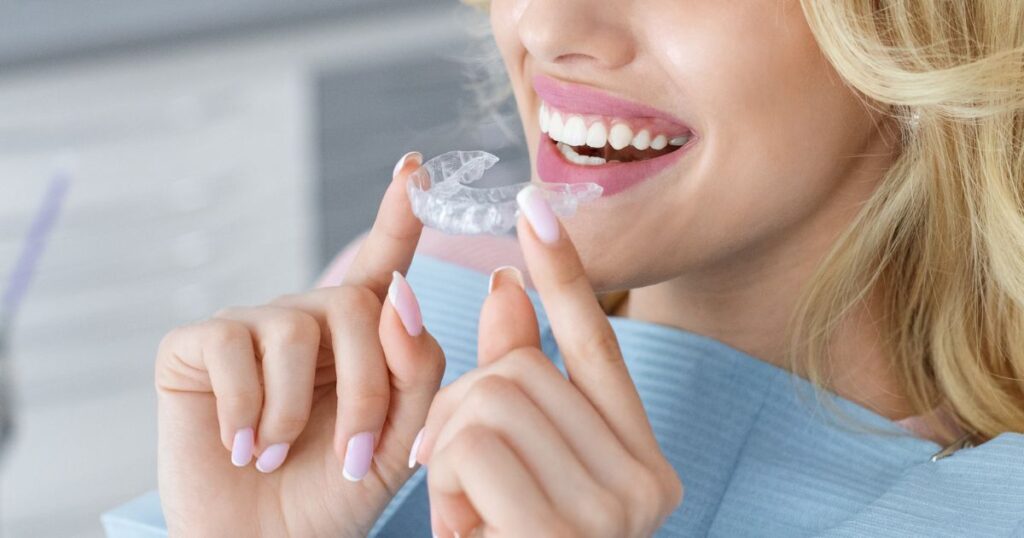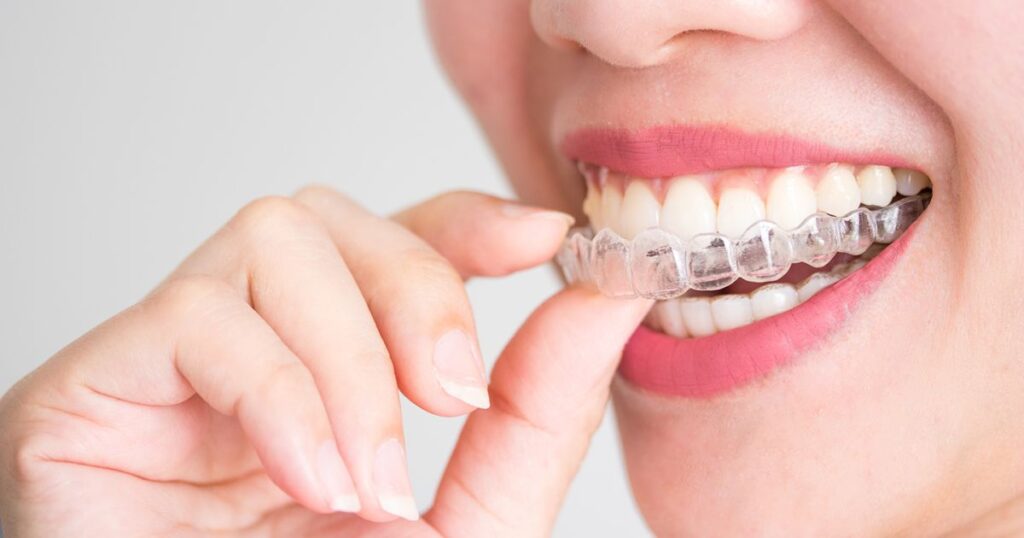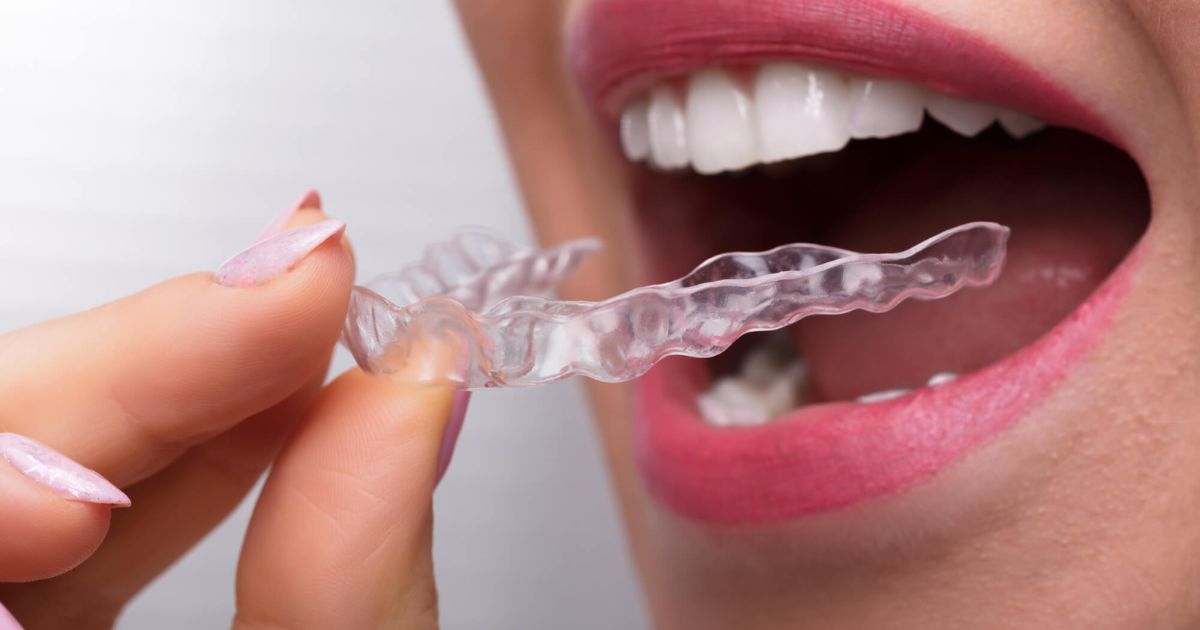Many people grind their teeth while sleeping without realizing it. This condition known as bruxism can cause dental problems over time if not addressed. This article explores whether Invisalign clear aligners are an option for correcting misaligned teeth in bruxism patients and managing teeth-grinding symptoms.
Did you know that approximately 8 out of 10 people grind their teeth to some degree, causing excess wear and potential damage over the years? If you suspect you may be a grinder too, learn how modern innovations like Invisalign clear aligners can potentially help straighten your smile while also protecting it from further harm.
This guide covers questions related to getting Invisalign treatment for bruxism. It discusses what teeth grinding is, potential causes, diagnosis methods, and how bruxism may impact Invisalign treatment or cost. You’ll also learn if nightguards can be worn with aligners and whether aligners themselves can double as grinding guards.
Can I Get Invisalign Aligners If I Grind My Teeth?

- Invisalign may be possible for mild-moderate bruxism with a proper treatment plan from your dentist or orthodontist.
- Grinding habits will need monitoring throughout treatment and a customized nightguard may be required for added protection of aligners.
- Severe grinding cases may not be suitable for aligners alone and other treatment options exist to address both alignment and bruxism simultaneously like traditional braces.
- Your provider can assess your specific grinding severity and create a customized plan weighing risks of further damage versus alignment goals.
Careful screening determines each patient’s bruxism management needs. Aligners combined with guards often sufficiently mitigate grinding risks. It’s important to discuss cost thoroughly with your dentist, as options like Partial Dentures Cost may impact your treatment plan and budget.
Can I Use a Nightguard During Invisalign Treatment?
Yes, a customized nightguard or mouthguard can still be worn while undergoing Invisalign. As aligners sit directly on tooth enamel, they alone may not prevent grinding damage. Nightly use of a fitted guard provides added protection by:
- Absorbing forces from teeth clenching and grinding that could crack or break aligners
- Shielding teeth from excessive pressure and micro-damage when grinding occurs
Many orthodontists make guards directly from Invisalign molds to seamlessly integrate with aligners. Regular nightguard employment helps preserve tooth integrity and straightening progress despite bruxism.
What is Teeth Grinding?
Teeth grinding, also called bruxism, refers to the condition of clenching and grinding one’s teeth together or against each other. It typically happens during sleep as an unconscious response to stress or other triggers.
Over time, this excessive jaw pressure leads to premature wear of tooth enamel and supporting structures like crowns, fillings, and orthodontic appliances. Left untreated, severe grinding can fracture or even wear down teeth completely, and cause headaches upon waking.
Bruxism rates increase under stress when teeth contact unconsciously. Most people exhibit mild occasional grinding versus chronic severe cases. Proper management through nightguards aims to limit structural damage to teeth and gums.
What are the Causes of Bruxism?
| Cause | Description |
| Stress/Anxiety | A common trigger for tensing jaw muscles involuntarily |
| Sleep Deprivation | Grinding behaviors may intensify from lack of rest |
| Genetics | Some risk is hereditary, especially for severe bruxism |
| Medical Conditions | Conditions like arthritis can induce grinding |
| Substance Use | Caffeine, supplements and drugs may aggravate bruxism |
While causes are often multifactorial, stress remains a primary factor for most occasional tooth grinders. Habitual stress reduction and protecting teeth help manage related damage long-term.
Can a Dentist Tell If You Grind Your Teeth?
Certain signs allow dentists to identify potential bruxism during exams:
- Tooth wear: Enamel on chewing surfaces shows premature flatness, roughness, or grooving
- Fillings/crowns: These restorations may be cracked, loose, or fractured from grinding pressure
- Jaw muscles: The masseter muscles beside the jaw line sometimes feel tender or hypertrophied
- Teeth sensitivity: Enamel loss exposes sensitive dentin underneath
Monitoring jaw movement or placing bite sensors overnight also helps confirm a grinding diagnosis objectively. Dentists are trained to spot telltale breakdowns consistent with excessive teeth contact during sleep.
Will Invisalign Cost change due to Bruxism?
Officially, Invisalign treatment pricing does not change based purely on a bruxism diagnosis alone. However, some factors associated with severe grinding cases may impact costs:
- Custom nightguards are typically included if deemed necessary by the dentist for aligner protection.
- More aligner sets than average could be needed if frequent alterations arise from grinding damage over time.
- Treatment may take longer to fully correct bite issues influenced by grinding habits.
Minor bruxism may not affect costs significantly. However severe chronic grinding potentially leading to delays or additions falls under “complex” treatment tier pricing with Invisalign. Overall, a consultation determines one’s individual needs.
Can Invisalign Be Used As a Nightguard?
While Invisalign trays cover teeth during the day, their material poses some limitations as a nightly grinding appliance:
- Clear plastic aligners are not as durable as customized acrylic nightguards fitted by dentists.
- Grinding forces risk cracking or breaking aligners if regular appliances are not also worn overnight.
- If cracked aligner pieces are swallowed or aspirated, health risks exist, unlike professionally made guards.
For these safety reasons, orthodontists routinely advise wearing a fitted mouthguard or nightguard specifically designed to absorb night grinding impacts to protect teeth and aligners simultaneously long-term. Custom-fitted ones remain the gold standard.
What are the Treatment Options for Managing Teeth Grinding during Invisalign?
For most mild-moderate grinding cases, options like customized nightguards paired with Invisalign allow straightening teeth safely. More aggressive options exist for severe habits:
- Nightguard: Absorbs forces from grinding, and protecting aligners and teeth.
- Traditional Braces: Help realign bite issues contributing to grinding habits over time.
- Mouth Splint: A surgical option to alter jaw joint positioning reducing grinding urges.
- Botox: Botox injections in jaw muscles may relax gritting movements short term.
Comprehensive exams determine optimal management on a case-by-case basis weighing severity and orthodontic needs together. Most grinders see positive results.
Can Grinding Habits Affect Invisalign Treatment Time?
Potentially yes – excessive bruxism could influence projected Invisalign treatment times if related bite issues require additional correction efforts:
- Grinding wears teeth down unevenly, complicating proper positioning goals.
- Repeated aligner damage or breakage from heavy grinding may mean more frequent replacements over time.
- Alterations to subsequent aligners may become necessary to account for grinding-induced changes needing reversal.
However, effective nightguard use and grinding control help ensure alignment progresses smoothly as planned for most mild-moderate grinders. Communication maintains optimal workflows between providers and patients.
Informed patients understand mild variables do not always delay clear results and work jointly toward solutions keeping bruxism managed and Invisalign on track. Self-care plays a vital role in treatment outcomes.
What is the connection between teeth grinding and TMJ disorders?
There exists a strong correlation between bruxism (teeth grinding) and temporomandibular joint (TMJ) problems:
- Grinding habits place undue strain on the TMJ over many years from repetitive clenching pressure.
- This constant overactivity and improper posture contribute greatly to TMJ dysfunction signs like clicking, popping, and jaw pain.
- Managing bruxism more effectively through nightguards and relaxation techniques helps relieve TMJ resulting from habitual teeth grinding.
Addressing a bruxism diagnosis significantly improves the chances of easing TMJ problems naturally versus just treating the joint symptoms alone. An integrated approach eyes the root behavioral triggers.
How does bruxism impact orthodontic treatment beyond Invisalign?

Grinding behaviors influence other aligner and brace therapies too by:
- Causing premature wear of wires, brackets, and elastics placed in the mouth.
- Hindering proper positioning of teeth from uneven force distribution during grinding.
- Possibly lengthening treatment if corrections to align bite issues are continuously undone.
As with Invisalign, functional appliances, mouthguards, or splints are typically incorporated into other orthodontic plans for bruxism sufferers. Early detection optimizes managing effects tooth grinding may impart beyond pure cosmetic concerns. Multifaceted solutions work best long-term.
Frequently Ask Questions
Can I wear a retainer if I grind my teeth?
Yes, but you may need a nightguard to wear over your retainer to prevent damage from grinding while sleeping. Talk to your orthodontist.
What teeth are too bad for Invisalign?
Severely misaligned teeth, teeth that need extensive movement, teeth with large gaps, or teeth that are broken, cracked, or heavily worn down may not be good candidates for Invisalign.
What type of teeth can’t get Invisalign?
Teeth that require orthodontic extractions usually can’t get Invisalign. Severely crowded teeth or teeth with large spacing issues may also be difficult to treat with aligners alone.
Can I wear Invisalign if I grind my teeth?
Yes, but you will likely need a nightguard to prevent damage to the aligners from grinding. Mild-moderate grinding can be managed, but severe grinding may make orthodontic treatment riskier without additional teeth protection measures.
Final Thoughts
In summary, bruxism presents challenges but need not preclude individuals from receiving Invisalign treatment. Provided grinding habits are not severe, aligners offer discrete straightening combined with customized nightguards or other functional avenues. While specific protocols vary, addressing underlying triggers assists greatly in preserving results over the long run.
By thoroughly screening severity and contributing factors, orthodontists design tailored approaches leveraging modern innovations. With routine care like nightly guards and stress management, mild-moderate grinders typically enjoy straighter smiles via aligners as smoothly as non-grinders. Overall, achieving ideal bite function and efficient treatment relies on an integrated process respecting individual oral health portraits.











